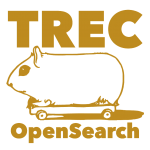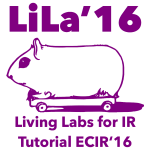There is a number of exciting developments around the living labs initiative that Anne Schuth and I have been working on. The goal that we are looking for in this activity is to enable researchers to perform online experiments, i.e., in-situ evaluation with actual users of a live site, as opposed to relying exclusively on paid assessors (or simulated users). We believe that this is nothing less than a paradigm shift. We define this new evaluation paradigm as follows:
The experimentation platform is an existing search engine. Researchers have the opportunity to replace components of this search engine and evaluate these components using interactions with real, unsuspecting users of this search engine.
 Our first pilot campaign, LL4IR, co-organized by Liadh Kelly, ran at CLEF earlier this year with two use-cases: product search and web search. See our (extended) overview paper for details. LL4IR will run again at CLEF next year with the same use-cases. Thanks to CLEF, our API has by now been used extensively and tested thoroughly: it has successfully processed over 0.5M query issues, coming from real users of the two search engines involved.
Our first pilot campaign, LL4IR, co-organized by Liadh Kelly, ran at CLEF earlier this year with two use-cases: product search and web search. See our (extended) overview paper for details. LL4IR will run again at CLEF next year with the same use-cases. Thanks to CLEF, our API has by now been used extensively and tested thoroughly: it has successfully processed over 0.5M query issues, coming from real users of the two search engines involved. Based on the positive feedback we received from researchers as well as commercial partners, we decided it’s time to go big, that is, TREC. Getting in to TREC is no small feat, given that the number of tracks is limited to 8 and a large number of proposals compete for the slot(s) that may get freed up each year. We are very pleased that TREC accepted our proposal and this attests to the importance of the direction we’re heading. At TREC OpenSearch we’re focusing on academic search. It’s an interesting domain as it offers a low barrier of entry with ad-hoc document retrieval, and at the same time is a great playground for current research problems, including semantic matching (to overcome vocabulary mismatches), semantic search (retrieving not just documents but authors, institutes, conferences, etc.), and recommendations (related literature). We are in the process of finalizing the agreements with academic search engines and plan to have our guidelines completed by March 2016.
Based on the positive feedback we received from researchers as well as commercial partners, we decided it’s time to go big, that is, TREC. Getting in to TREC is no small feat, given that the number of tracks is limited to 8 and a large number of proposals compete for the slot(s) that may get freed up each year. We are very pleased that TREC accepted our proposal and this attests to the importance of the direction we’re heading. At TREC OpenSearch we’re focusing on academic search. It’s an interesting domain as it offers a low barrier of entry with ad-hoc document retrieval, and at the same time is a great playground for current research problems, including semantic matching (to overcome vocabulary mismatches), semantic search (retrieving not just documents but authors, institutes, conferences, etc.), and recommendations (related literature). We are in the process of finalizing the agreements with academic search engines and plan to have our guidelines completed by March 2016. Using our API is easy (with documentation and examples available online), but it is different from the traditional TREC-like way of evaluation. Therefore, Anne and I will be giving a tutorial, LiLa, at ECIR in Padova in March, 2016. The timing is ideal in that it’s well before the TREC and CLEF deadlines and allows prospective participants to familiarize themselves with both the underlying theory and the practicalities of our methodology.
Using our API is easy (with documentation and examples available online), but it is different from the traditional TREC-like way of evaluation. Therefore, Anne and I will be giving a tutorial, LiLa, at ECIR in Padova in March, 2016. The timing is ideal in that it’s well before the TREC and CLEF deadlines and allows prospective participants to familiarize themselves with both the underlying theory and the practicalities of our methodology.